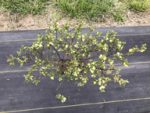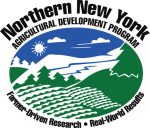
Willsboro, NY; June 20, 2024. The latest results of “superfruits” research funded by the Northern New York Agricultural Development Program (NNYADP) will be featured during a July 10, 2024 field day at the Willsboro Research Farm. Data from the farm and participating growers with juneberry, honeyberry, aronia, and elderberry crops are posted at www.nnyagdev.org under the About: Projects by Year tab. The 1:30-4:00 p.m. tour is free, open to the public, and will include multiple types of research projects.
Juneberry, honeyberry, aronia, and elderberry are referred to as “superfruits” for their high anti-oxidant, high phytonutrient value sought out by consumers, making them economically significant crops as well.
“Multiple growing seasons with a wide range of environmental conditions as well as pest and disease challenges provide a broad-based ‘laboratory’ for developing best practices to help growers adapt year-to-year,” said Willsboro Research Farm Manager Michael H. Davis, Ph.D.
Dr. Davis and SUNY Plattsburgh Assistant Professor of Biology and botanist Michael B. Burgess, Ph.D., initiated the “superfruits for northern New York” research in 2013, collecting wild varieties to plant alongside commercially-available varieties of juneberry. With NNYADP grant funding, they established New York state’s only juneberry research nursery at Willsboro in 2014.
Today, the Willsboro superfruits research trials include 25 varieties of juneberry, 16 varieties of honeyberry, six varieties of aronia, and seven varieties of elderberry.
JUNEBERRY: Spongy moth damage of 2022 seen in 2023
Most of the commercial and wild-collected fruiting varieties of juneberry at the Willsboro farm did not produce any flowers in 2023 and those that did had very few flowers.
“The extensive spongy moth infestation that defoliated the trial in 2022 likely depleted the resources the fruiting variety plants needed for flower and fruit production in 2023,” said Dr. Davis.
The ornamental varieties of juneberry in the trial not defoliated by the moths in 2022 flowered profusely in 2023.
A grower in Essex County with 10 varieties of juneberry, unaffected by spongy moth caterpillar in 2022, saw significant flowering in early May 2023, just before a severe frost eliminated the opportunity for harvestable fruit yield.
HONEYBERRY: Flowered well, but fruit yield down
In 2023, eighteen of the twenty honeyberry varieties in the Willsboro trial flowered well and in an overlapping pattern necessary for cross-pollination and fruit set. Fruit yield; however, was lower compared to 2021 for all the varieties.
“Fruit yield drop for two years in a row, and shorter than expected bush growth, requires a closer look at nutrient and irrigation management. In 2024 we have aggressively pruned the honeyberry trial to open the canopies that had become dense over some of the varieties,” Dr. Davis explained.
ARONIA: Yield rebounded, but needs attention
Spongy moth damaged but did not defoliate the aronia trial in 2022; howver, the fruiting that year was unproductive. Fruit yield rebounded somewhat in 2023, but did not reach production levels of 2020 and 2021. Dr. Davis is evaluating aronia’s nutritional needs for any deficiencies that might impact the potential for fruit yield. A mid-May freeze damaged the aronia trial in 2023 after the plants were in full bloom.
ELDERBERRY: Deer browse a problem
Elderberry was added to the NNYADP superfruits research roster in 2021. In 2023, deer heavily damaged the trial of five American and two European varieties of elderberry. One plant not impacted by the deer browse reached a height of approximately seven feet and produced flower and fruit. Additional deer fencing has been installed to protect the plants year-round.
Commercial growers in Clinton, Essex, Franklin, Jefferson, Lewis and St. Lawrence counties have supported this research with data and observations from their own on-farm plantings since 2017. They are marketing fresh-picked and u-pick fruit and value-added products using their fruits.
 NNYADP superfruits research results are publicly-accessible at nnyagdev.org.
NNYADP superfruits research results are publicly-accessible at nnyagdev.org.
Funding for the Northern New York Agricultural Development Program is supported by the New York State Legislature through the New York State Assembly and administrated by the New York State Department of Agriculture and Markets.